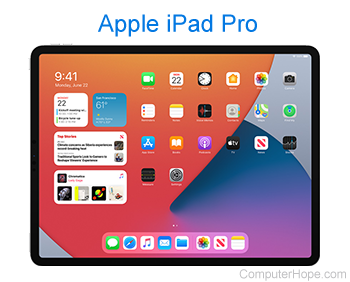Computer history - 2010
Major computer events in 2010

Apple introduced the iPad on January 27, 2010, with its new custom silicon Apple A4 chip.
On July 19, 2010, Amazon released a press release mentioning it was now selling more Kindle books (eBooks) than hardcover books.
Instagram was launched in October 2010.
2010 computer and technology top terms
The following are some top computer and technology-related terms in alphabetical order that were introduced or popularized in 2010.
New computer products and services introduced in 2010
Intel released the Core 2 Quad processor Q9500 (6 M cache, 2.83 GHz, 1333 MHz FSB) in January 2010.
Intel released the first Core i5 mobile processors, the i5-430M (3 M cache, 2.27 GHz, 1066 MHz FSB) and the i5-520E (3 M cache, 2.4 GHz, 1066 MHz FSB), in January 2010.
Intel released the first Core i5 desktop processor over 3.0 GHz, the i5-650 (4 M cache, 3.20 GHz, 1333 MHz FSB) in January 2010.
Intel released the first Core i3 desktop processors, the i3-530 (4 M cache, 2.93 GHz, 1333 MHz FSB) and the i3-540 (4 M cache, 3.06 GHz, 1333 MHz FSB), on January 7, 2010.
Intel released the first Core i3 mobile processors, the i3-330M (3 M cache, 2.13 GHz, 1066 MHz FSB) and the i3-350M (3 M cache, 2.27 GHz, 1066 MHz FSB), on January 7, 2010.
Android version 2.1 was released on January 12, 2010.
Apple released the A4 processor on January 27, 2010.
The Apple iOS app iBooks was introduced with the iPad in January 2010.
Fiverr was released on February 1, 2010.
Google Buzz was released on February 9, 2010.
Google Fiber was released on February 10, 2010.
Pinterest was founded by Ben Silbermann and launched in March 2010 as a closed beta.
Google Drawings was released on April 12, 2010.
AMD released the first Phenom II X6 (hex/six core) processors (6 M cache, 2.6 to 3.3 GHz, or 3.7 GHz with Turbo Core, 1066 MHz or 1333 MHz FSB) on April 27, 2010.
Adobe Photoshop CS5 (12.0) was released on April 30, 2010.
Android version 2.2 (Froyo) was released on May 20, 2010.
WebM was released on May 19, 2010.
GroupMe was released in May 2010.
Tampermonkey was released in May 2010.
OnLive introduced its flagship cloud gaming service on June 17, 2010.
Apple introduced the iPhone 4 on June 24, 2010.
The Quora website launched in June 2010.
Samsung introduced the Samsung Galaxy S in June 2010.
Blizzard Entertainment released StarCraft 2 on July 27, 2010, twelve years after the release of its popular and successful predecessor, StarCraft. The game sold over 3 million copies in its first month of release and became the fastest-selling real-time strategy game ever at the time.
Samsung released its first tablet computer, the Galaxy Tab, on September 2, 2010, featuring a 7-inch touch screen display.
On September 7, 2010, a "Toybox" feature was added to Garry's Mod. This feature allows players to utilize the Amazon S3 to download content from third-party sources, including weapons, maps, and props.
Google released the image format WebP on September 30, 2010.
The Document Foundation released LibreOffice on September 28, 2010.
Fortran 2008 was published in September 2010.
Apple introduced macOS X 10.7, code-named Lion, at the "Back to the Mac" event on October 20, 2010.
Microsoft released the Kinect for the Xbox 360 on November 4, 2010.
Android version 2.3 (Gingerbread) was released on December 6, 2010.
Microsoft released Excel 2010 in 2010.
Microsoft released Word 2010 for PC and Mac in 2010.
Fuduntu was released in 2010.
OwnCloud was introduced in 2010.
Facebook introduced Facebook Messenger and Open Graph in 2010.
Google released Google Web Fonts, which is now known as Google Fonts.
Kik Interactive launched Kik in October 2010.
Illumos was introduced in 2010.
Mageia Linux was released in 2010.
Barnes & Noble released its Nook Color device on November 16, 2010. It featured a 7-inch touch screen display and used an 800 MHz ARM Cortex-A8 processor.
Microsoft Office Web Apps was introduced in 2010, and the service would later become Office Online.
Path social network site was released in 2010.
Philo was released in 2010.
Wide Quad Extended Graphics Array was released for LCD (Liquid-Crystal Display) in 2010.
AMD introduced 8 and 12 core technology for its Opteron line of processors.
Google released the Google Nexus in 2010.
Dell released the XPS 8100, XPS 9100, XPS 15, and XPS 17 in 2010.
Computer and technology-related events in 2010
Google founded Google X (now named "X") in January 2010.
USB (Universal Serial Bus) 3.0 (SuperSpeed USB) certified devices became available in January 2010.
On February 20, 2010, the Personal Computer Museum demonstrated that old computers were still useful by showing a Commodore VIC-20 capable of viewing and making Twitter posts.
The Large Hadron Collider successfully had collisions, creating the first miniature big bang on March 30, 2010.
The first non-Latin web addresses appeared with Egypt, Saudi Arabia, and the United Arab Emirates country codes in Arabic scripts on May 6, 2010.
Google Authenticator was released on September 20, 2010.
Cloudflare launched its web protection and optimization services on September 27, 2010.
Intel released the AHCI (Advanced Host Controller Interface) specification in October 2010.
Microsoft announced plans to release Windows Phone 7 on October 11, 2010.
The first all-robotic surgery was performed at Montreal General Hospital on October 13, 2010.
MachinimaSports became the one billionth subscriber on YouTube on October 28, 2010.
On November 2, 2010, the FBI issued a press release indicating more than 200 reported incidents of sextortion, citing it as a serious issue in cybersecurity.
United States Cyber Command achieved full operational capability on November 5, 2010.
Planet Calypso, a virtual planet in the game Entropia, became the most valuable virtual item, selling for $635,000.00 on November 12, 2010.
Netflix moved from Oracle and IBM to AWS (Amazon Web Services) in 2010 to save money and get more flexibility.
4G technology saw HSPA+ (Evolved High-Speed Packet Access) and LTE (Long-Term Evolution) added to its definition in December 2010.
Mark Zuckerberg was named TIME Person of the Year on December 15, 2010.
Raffaele Forte released BackBox Linux in 2010.
OpenStack was established in 2010.
The IPTO (Information Processing Technology Office) was combined with DARPA's TCTO (Transformational Convergence Technology Office) to form the I2O (Information Innovation Office).
Apple announced in 2010 that over 10 billion tracks were downloaded from iTunes since its initial release.
AdChoices was created in 2010.
The CoffeeScript programming language was released in 2010.
GhostBSD was released in 2010.
After an online petition, Google adopted "hella" as a scientific prefix in 2010 to help describe a hellabyte.
The Slate PC (personal computer) was introduced with the Lenovo IdeaPad at CES (Consumer Electronics Show) 2010.
Android overtook Symbian OS (Operating System) as the most widely used smartphone operating system in 2010.
Tabnabbing was a phishing method discovered by security researcher Aza Raskin in 2010.
Computer companies and organizations founded in 2010
The humanitarian organization GWOB (Geeks Without Bounds) was founded on October 10, 2010, by Johnny Higgins and Willow Brugh.
CapTherm Systems was founded in 2010.
Ezoic was founded in 2010 by Dwayne Lafleur.
Fancy Hands was founded in 2010 by Ted Roden.
Nest Labs was founded in 2010 by Tony Fadell and Matt Rogers.
Pantum was founded in 2010.
Xiaomi was founded in 2010 by Lin Bin and Lei Jun.
Renesas Electronics Corporation was founded in 2010.
Stripe was founded in 2010 by Patrick Collison and John Collison.
Tipalti was founded by Chen Amit and Oren Zeev in 2010.
Whisper Systems was co-founded in 2010 by Moxie Marlinspike and Stuart Anderson.
Computer company events in 2010
On January 27, 2010, Oracle announced it had completed the acquisition of Sun Microsystems, which included Solaris, VirtualBox, and ZFS.
CenturyLink acquired Qwest on April 22, 2010.
On April 28, 2010, Hewlett-Packard purchased the Palm company (3COM), the makers of the Palm Pilot, and the rights to WebOS.
Symantec announced it would be acquiring PGP Corporation on April 29, 2010.
On May 27, 2010, Silicon Integrated Systems (SiS) took control of XGI Technology and its iTV technology and, by October 2010, acquired the rest of XGI's assets.
Apple surpassed Microsoft as the most valuable technology company on May 26, 2010.
On June 8, 2010, PMC-Sierra, Inc. completed its acquisition of Adaptec, Inc. storage division and became "Adaptec by PMC."
Woot.com announced it had signed an agreement to be acquired by Amazon.com on June 30, 2010.
GFI Software acquired Sunbelt Software on July 13, 2010.
Intel purchased the company McAfee on August 19, 2010.
Atlassian acquired project hosting and code collaboration service Bitbucket on September 29, 2010.
Best Data acquired BFG Technologies in September 2010.
In October 2010, Intergraph was acquired by Hexagon AB, becoming a division of Hexagon.
Trilobyte Games re-opened in November 2010 to release some of its popular titles on the iPhone and iPad.
The Google service Google Base was deprecated on December 17, 2010.
Rovi announced it would acquire Sonic Solutions on December 24, 2010.
Arescom went out of business in 2010.
Thilo Utke and Alexander Lang created Cobot, an employee management software for business owners.
Comcast began using the XFINITY name as they started rebranding the company.
GoFundMe was launched in 2010.
RealNetworks spun off Rhapsody as its own business in 2010.
TechCrunch was acquired in 2010 by AOL (America Online).
Vigor gaming went out of business.
Security breaches and leaks in 2010
The Stuxnet worm was discovered, which disabled one-fifth of all uranium enrichment centrifuges in Iran.
Computer-related TV shows and movies released in 2010
The movie Tron: Legacy was released on December 17, 2010. A modern take on the 1982 Tron movie, where the son of a virtual world designer goes looking for his father inside a digital world his father designed.
Catfish, a docudrama about young filmmakers documenting their colleague's budding online friendship with a young woman that leads to an unexpected discovery, was released in 2010.
Get Lamp, a Jason Scott documentary about computer adventure games, was released in 2010.
The Social Network, a 2010 biopic movie about Mark Zuckerberg and his creation of the social networking site Facebook, was released.
The Virtual Revolution, a BBC TV series covering the profound changes since the invention of the World Wide Web, was released in 2010.
Truth in Numbers? Everything, According to Wikipedia, a provocative documentary about Wikipedia, was released in 2010.
Discontinued products and services in 2010
Limewire ceased operations in October 2010 after a court of the United States federal government issued an injunction.
The ICRA (Internet Content Rating Association) was discontinued in 2010.
The xD-Picture Card standard was phased out around 2010 as the SD card became the primary technology.
Computer pioneer deaths in 2010

Herbert Grosch passed away on January 18, 2010 (Age: 92).
Max Hopper passed away on January 25, 2010 (Age: 75).
Robin Milner passed away on March 20, 2010 (Age: 76).
Ed Roberts passed away on April 1, 2010 (Age 68).
Valentin Turchin passed away on April 7, 2010 (Age: 79).
Alexander Shafto Douglas passed away on April 29, 2010 (Age: 89).
Max Palevsky passed away on May 5, 2010 (Age: 85).
Carl Petri passed away on July 2, 2010 (Age: 84).
James Thomas passed away on August 6, 2010 (Age: 64).
Richard Canning passed away on September 21, 2010 (Age: 91).
Maurice Wilkes passed away on November 29, 2010 (Age: 97).
John Bennet passed away on December 9, 2010 (Age: 89).
David Noble passed away on December 27, 2010 (Age: 65).
